2019年【开学教材全解】高中英语英语必修一《unit 1 Friendship》 Learning anout Language 课堂教学课件语
高中英语必修一unit1friendship
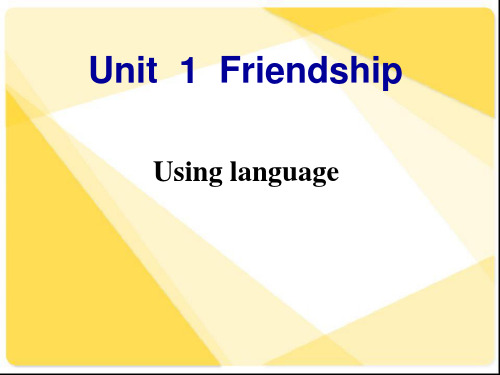
Choose the best answer.
1. What is Miss Wang’s attitude toward Lisa’s friendship with the boy? C A. Angry B. Upset C. Supportive
2. What’s Miss Wang’s advice? C A. Ignore the boy. B. Ignore her classmates C. Ignore her gossiping classmates
Yours, Miss Wang
Reading and writing
Step 1: Read Xiao Dong’s letter . What is Xiao Dong’s problem?
Dear Miss Wang,
I'm a student from Huzou Senior High School.I have a problem.I'm not very good at communicating with people.Although I try to talk to my classmates,I still find it hard to make good friends with them.So I feel quite lonely sometimes.I do want to change this situation,but Idon't know how.I would be grateful if you could give me some advice.
Unit 1 Friendship
Using language
Reading and Listening
高中英语:Unit 1 Friendship同步讲解(新人教版必修1) 教案
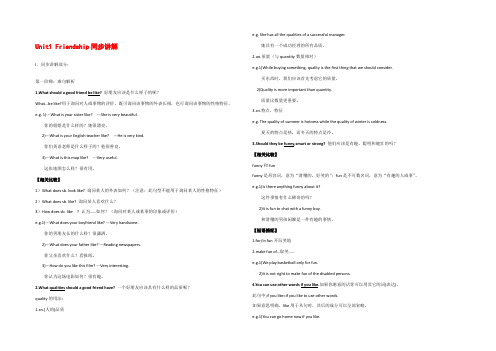
Unit1 Friendship同步讲解I.同步讲解部分:第一阶梯:难句解析1.What should a good friend be like?好朋友应该是什么样子的呢?What…be like?用于询问对人或事物的评价。
既可询问该事物的外表长相,也可询问该事物的性格特征。
e.g. 1)---What is your sister like? ---She is very beautiful.你的姐姐是什么样的?她很漂亮。
2)---What is your English teacher like? ---He is very kind.你们英语老师是什么样子的?他很善良。
3)---What is this map like? ---Very useful.这张地图怎么样?很有用。
【相关比较】1)What does sb. look like? 询问某人的外表如何?(注意:此句型不能用于询问某人的性格特征)2)What does sb. like? 询问某人喜欢什么?3)How does sb. like ? 认为……如何?(询问对某人或某事的印象或评价)e.g.1)---What does your boyfriend like? ---Very handsome.你的男朋友长的什么样?很潇洒。
2)---What does your father like? ---Reading newspapers.你父亲喜欢什么?看报纸。
3)---How do you like this film? ---Very interesting.你认为这场电影如何?很有趣。
2.What qualities should a good friend have? 一个好朋友应该具有什么样的品质呢?quality的用法:.(人的)品质e.g. She has all the qualities of a successful manager.她具有一个成功经理的所有品质。
2019-2020年人教版高中英语必修1《Unit1Friendship》5课时教案设计附教学反思
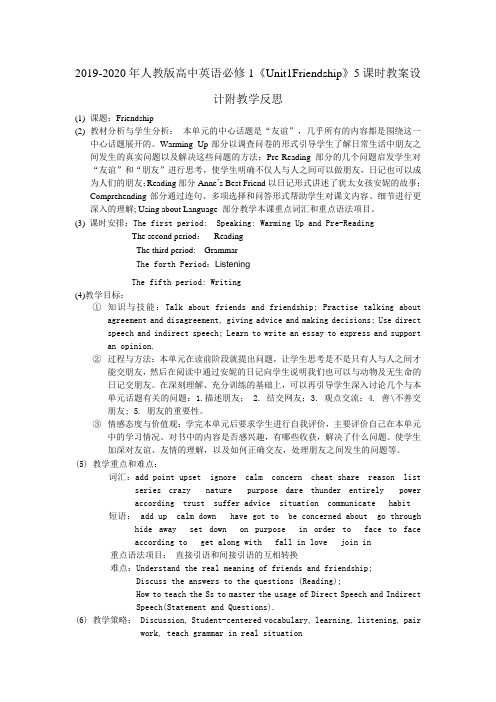
2019-2020年人教版高中英语必修1《Unit1Friendship》5课时教案设计附教学反思(1)课题:Friendship(2)教材分析与学生分析:本单元的中心话题是“友谊”,几乎所有的内容都是围绕这一中心话题展开的。
Warming Up部分以调查问卷的形式引导学生了解日常生活中朋友之间发生的真实问题以及解决这些问题的方法;Pre-Reading部分的几个问题启发学生对“友谊”和“朋友”进行思考,使学生明确不仅人与人之间可以做朋友,日记也可以成为人们的朋友;Reading部分Anne’s Best Friend以日记形式讲述了犹太女孩安妮的故事;Comprehending部分通过连句、多项选择和问答形式帮助学生对课文内容、细节进行更深入的理解; Using about Language 部分教学本课重点词汇和重点语法项目。
(3) 课时安排:The first period: Speaking: Warming Up and Pre-ReadingThe second period:ReadingThe third period: GrammarThe forth Period:ListeningThe fifth period: Writing(4)教学目标:①知识与技能:Talk about friends and friendship; Practise talking aboutagreement and disagreement, giving advice and making decisions; Use directspeech and indirect speech; Learn to write an essay to express and supportan opinion.②过程与方法:本单元在读前阶段就提出问题,让学生思考是不是只有人与人之间才能交朋友,然后在阅读中通过安妮的日记向学生说明我们也可以与动物及无生命的日记交朋友。
必修一Unit 1 Friendship单元知识详解

Book 1Unit 1 Friendship单元目标导航重点词汇汉译英1.心烦意乱;不安的;不适的adj.使不安;使心烦vt.2.(使)担忧,涉及,关系到vt.担心,关注n.3.松的,松开的adj.4.打雷;雷鸣vi.雷声n.5.能力;力量;权力n.6..窗帘;门帘n.7.伙伴;合伙人n.8.确实如此;正是;确切地adv.9.完全地,整个地adv.英译汉10 .German11 .disagree12 .item13.settle14.recover15.suffer16.teenager17.grateful18.tip19.swap20.dislike21.series词汇拓展1.add v. n. adj.2.ignore v. adj.(无知的)n.(无知)3.German n./adj. n.(德国)4.dusty adj. n.6.settle v. n.(定居) n.(定居者)7.suffer v. n. (苦难) n.(苦难者)8.recover v. n.9.loneliness n. adj.10.exactly adv. adj.重点词组1.(使)平静下来;(使)镇定下来2. 参加,加入3. 一连串,一系列,一套4. 故意5.在黄昏时刻6.面对面地7.关心;挂念8.与....相处;进展9.go through10.set down11.suffer from12.add up13.pack sth up14.get/be tire of15.no longer/not any...longer16.fall in love重点句型1.在被发现之前她与家人已经躲藏了近25个月了。
She and her family hid away for nearly twenty-five months they were discovered.2.在日记里我不愿意像大多数人那样记一些流水账.....I don’t want to set down a series of facts in a diary most people do.....3.......这是一年半后我第一次面对夜空............it was the first time in a year and a half that I the night face to face......4.她发现在藏身之处安定下来是困难的......She found difficult to settle and calm down in the hiding place....5.人们相信当大家和睦相处时,这些岛屿可能就成为天堂了。
人教版高中英语必修一UnitOneFriendship.doc
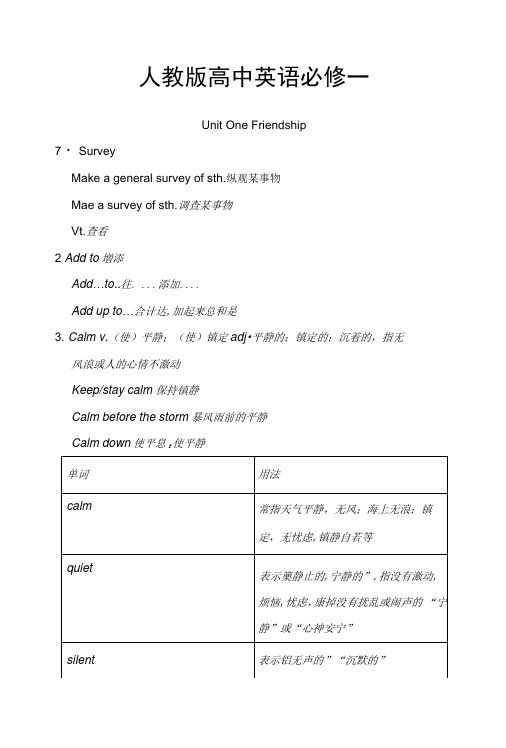
人教版高中英语必修一Unit One Friendship7・ SurveyMake a general survey of sth.纵观某事物Mae a survey of sth.调查某事物Vt.查看2 Add to増添Add…to..往. ... 添加....Add up to…合计达,加起来总和是3. Calm v.(使)平静;(使)镇定adj•平静的;镇定的;沉着的,指无风浪或人的心情不激动Keep/stay calm 保持镇静Calm before the storm暴风雨前的平静Calm down使平息f使平静动作的状态4. Ignore vt.忽视,对.••…不予理睬Ignorance门・无知Ignorant adj.无知的,不知道的Be ignorant of/about sb. /sth.对某人 / 某物不知道5. Upset v.使不安9使心烦;打乱,搅乱(计划等);弄翻;使不舒服的adj. 心烦意乱的(不置于名词前);(胃等)不舒服;(计划等)搅乱的;翻倒的6. Have got to(=have to)不得不,必须(1) have got to 的否定式为haven't got to; have to 的否定式为don'thave to。
用于疑问句中时,前者have提前,后者借助于助动词do。
(2)表示一次性动作时,两者可以互换。
担当表示习惯性动作时,尤其是当句子中含有always, often, sometimes等频率副词时,则应使用have to ,不使用have got to。
(3) have got to罕用于过去时,而have to除可用于过去时外,还可与情态动词,助动词连用9可用于完成时结构中。
(4 ) have (got)to与must都意为“必须”,但must作为情态动词无时态以及人称和数的变化,而have (got) to贝!!有。
Have (got) to表示客观需要must则表示主观看法。
【推荐下载】人教版高一英语必修一Unit1 Friendship单词解析
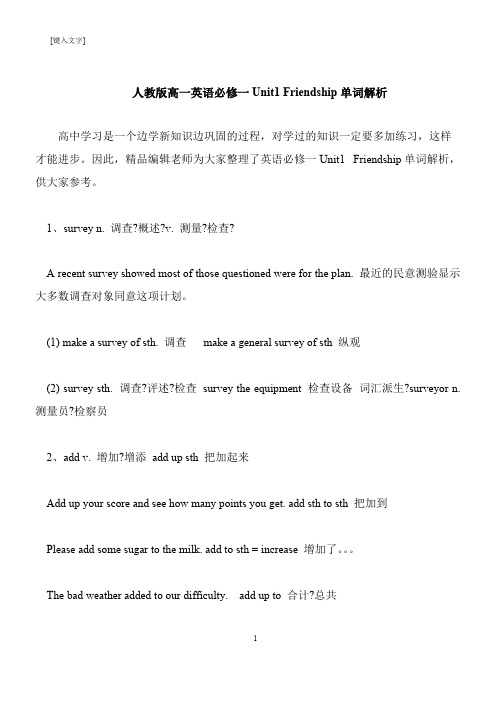
[键入文字]
人教版高一英语必修一Unit1 Friendship单词解析
高中学习是一个边学新知识边巩固的过程,对学过的知识一定要多加练习,这样才能进步。
因此,精品编辑老师为大家整理了英语必修一Unit1 Friendship单词解析,供大家参考。
1、survey n. 调查?概述?v. 测量?检查?
A recent survey showed most of those questioned were for the plan. 最近的民意测验显示大多数调查对象同意这项计划。
(1) make a survey of sth. 调查make a general survey of sth 纵观
(2) survey sth. 调查?评述?检查survey the equipment 检查设备词汇派生?surveyor n. 测量员?检察员
2、add v. 增加?增添add up sth 把加起来
Add up your score and see how many points you get. add sth to sth 把加到
Please add some sugar to the milk. add to sth = increase 增加了。
The bad weather added to our difficulty. add up to 合计?总共
1。
【开学-教材全解】高中英语英语必修一《unit 1 Friendship》 Learning anout Language 课堂教学课件
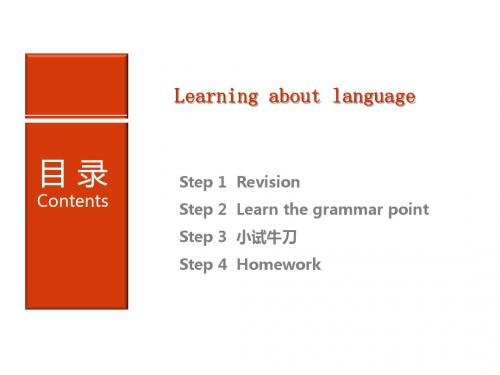
Contents
Learning about language
Step 1 Revision Step 2 Learn the grammar point Step 3 小试牛刀 Step 4 Homework
Step 1
Revision
Review something about “Anne’s Best Friend” by using some True-or-False sentences.
2.He said,“You are interested in English, aren’t you?” He asked whether I was interested in English. 3.“Have you been to the USA?” Jim asked Tom. Jim asked Tom whether/if he had been to the USA.
A.that were we;this
B.that we were;that
C.if were we;this
D.if we were;that
6.Jane said,“What did he hear about a week ago?” →Jane asked___B___ about______ . A.that he heard;a week ago B.what he had heard;a week before C.what he had heard;a week ago D.if he heard;a week before
afternoon.
间接引语
3.Jack said to me,“I have waited for you for a long
【教育资料】【开学-教材全解】高中英语英语必修一《Unit 1 Friendship》 单元测试资料库-任务型阅读学习精
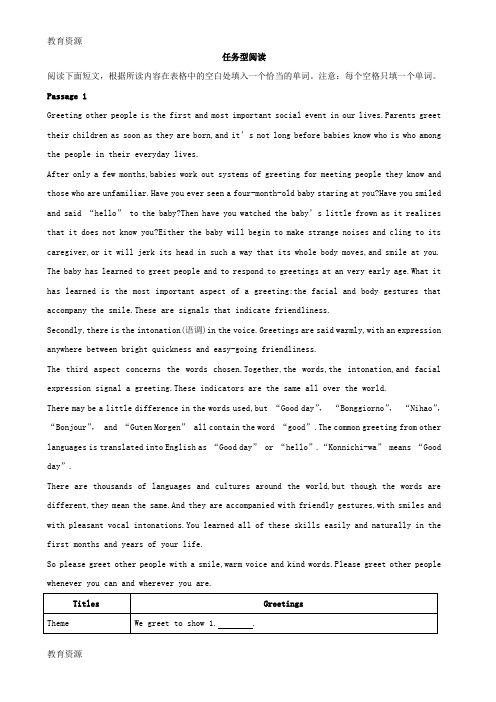
任务型阅读阅读下面短文,根据所读内容在表格中的空白处填入一个恰当的单词。
注意:每个空格只填一个单词。
Passage 1Greeting other people is the first and most important social event in our lives.Parents greet their children as soon as they are born,and it’s not long before babies know who is who among the people in their everyday lives.After only a few months,babies work out systems of greeting for meeting people they know and those who are unfamiliar.Have you ever seen a four-month-old baby staring at you?Have you smiled and said “hello” to the baby?Then have you watched the baby’s little frown as it realizes that it does not know you?Either the baby will begin to make strange noises and cling to its caregiver,or it will jerk its head in such a way that its whole body moves,and smile at you. The baby has learned to greet people and to respond to greetings at an very early age.What it has learned is the most important aspect of a greeting:the facial and body gestures that accompany the smile.These are signals that indicate friendliness.Secondly,there is the intonation(语调)in the voice.Greetings are said warmly,with an expression anywhere between bright quickness and easy-going friendliness.The third aspect concerns the words chosen.Together,the words,the intonation,and facial expression signal a greeting.These indicators are the same all over the world.There may be a little difference in the words used,but “Good day”,“Bonggiorno”,“Nihao”,“Bonjour”, and “Guten Morgen” all contain the word “good”.The common greeting from other languages is translated into English as “Good day” or “hello”.“Konnichi-wa” means “Good day”.There are thousands of languages and cultures around the world,but though the words are different,they mean the same.And they are accompanied with friendly gestures,with smiles and with pleasant vocal intonations.You learned all of these skills easily and naturally in the first months and years of your life.So please greet other people with a smile,warm voice and kind words.Please greet other people whenever you can and wherever you are.答案:1.friendliness 2.others 3.aspects/indicators4.smile5.warm6.choice7.Greetings 8.from 9.meaning 10.possiblePassage 2It is interesting to know what people of different nations like to do best.In France,when a woman enters a caf é or restaurant,she is freely discussed,not only about her appearance but about her past and future as well.She invites looks in the street whether she is beautiful or plain.There is no better way for a woman to get back her self-confidence than a walk in the streets of Paris or Marseilles,and women really like that.In Italy,people love talking.They sit about in cafes,exchanging news and discussing politics.They do not hesitate to ask questions about the family,income and private life of anybody who happens to be there.The Swiss eat as a dies walk into a teashop,eat a couple of ice creams and a large piece of chocolate cake,and then leave,complaining about their weight.For the Americans,the greatest fondness is said to be the push of buttons.You push a button in the lift,you push a button for cigarette,chewing gums,stamps,even for a life insurance.You can even push a button to get married and another button to get divorced.In England,waiting in a line is national passion.The English will form a line whether they have the opportunity or not.Long queues can be seen,for example,at stations when the train is practically empty and everybody can have a seat.答案:1.nations/countries 2.looks 3.walk 4.talking 5.private 6.food 7.regret A9.by/through 10.wait十、七选五阅读填空根据短文内容,从短文后的选项中选出能填入空白处的最佳选项。
- 1、下载文档前请自行甄别文档内容的完整性,平台不提供额外的编辑、内容补充、找答案等附加服务。
- 2、"仅部分预览"的文档,不可在线预览部分如存在完整性等问题,可反馈申请退款(可完整预览的文档不适用该条件!)。
- 3、如文档侵犯您的权益,请联系客服反馈,我们会尽快为您处理(人工客服工作时间:9:00-18:30)。
A.rise
B.rises
C.rose
D.will rise
Step 3
小试牛刀
11.The reporter said that the UFO____A__ from east
to west when he saw it.
A.was traveling
1.“Whose book is it?” he asked. He asked whose book it was.
2.“Whose book are you reading?” Jim asked her. Jim asked her whose book she was reading.
3. He asked,“Where are you going?” He asked (us) where we were going.
Step 2 Learn the grammar point
8.“I must go,”Mary said. Mary said that she must go.
9.She says,“I’ll never forget the days in the country.” She says that she’ll never forget the days in the country.
……
Step 2 Learn the grammar point
【观察2】将下面的句子变成间接引语并总结一下变化规则。(小 组讨论)
1.Mary said,“I am very happy to help you.” Mary said that she was very happy to help me. 2.Mary said,“ I want to buy the skirt in this shop.” Mary said that she wanted to buy the skirt in that shop.
4. He said,“Where have you been?” He asked me where I had been.
【发现4】
Step 3
小试牛刀
1.Jack said to me,“You look worried today.”
→Jack told me that__D____ worried______.
→Mr Black said that ____B__ a long way______ .
A.I had walked;last week
B.he had walked;that week
C.I walked;last week
D.he has walked;this week
4.The man thought,“I shall take it back tomorrow.” →The man thought that___D___ take it back______ .
A.that were we;this
B.that we were;that
C.if were we;this
D.if we were;that
6.Jane said,“What did he hear about a week ago?” →Jane asked___B___ about______ . A.that he heard;a week ago B.what he had heard;a week before C.what he had heard;a week ago D.if he heard;a week before
Mary said that she had watched a very interesting TV programme the day before.
7.“The earth goes around the sun,”Mary said. Mary said that the earth goes around the sun.
【发现2】
……
Step 2 Learn the grammar point
【观察3】将下面的句子变成间接引语并总结一下变化规则。 (小组讨论) 1.He said,“Do you have any difficulty with your pronunciation?” He asked (me) whether/if I had some difficulty with my pronunciation.
A.we were walking;then
B.you are walking;now
C.they were walking;then
D.they are walking;now
Step 3
小试牛刀
3.Mr Black said,“I have walked a long way this week.”
Step 3
小试牛刀
7.She asked,“Whose house will he break into next time?”
→She asked whose house___C___ break into______ .
A.will he;next time B.would he;the next time
3.“I am doing a biology experiment now,”Mary said. Mary said that she was doing a biology experiment then. 4.“I am not free today,”Mary said. Mary said that she was not free that day.
Step 2 Learn the grammar point
【观察1】观察下列句子,指出哪些是直接引语,哪些是间
接引语。(小组讨论)
1.He said,“I’m going to see a film this afternoon.”
直接引语
2.He said that he was going to see a film that
Step 2 Learn the grammar point
5.“I am going to write a report next week,”Mary said. Mary said that she was going to write a report the
next week.
6.“I watched a very interesting TV programme yesterday,”Mary said.
A.he looks;today
B.you look;today
C.we looked;that day
D.I looked;tha,“They’re walking across the street now.”
→We told her that__C____ across the street______.
B.you spend your
C.she spends her
D.you spent your
Step 3
小试牛刀
9.Black asked me,“Why haven’t you left here yet?”
→Black asked me why___A___ yet.
A.I hadn’t left there
1.A friend would laugh at you.( F ) 2.Anne lived in Amsterdam in the Netherlands during World War Ⅱ.( T ) 3.She and her family hid away for one year before they were discovered.( F )
Step 1
Revision
4.She kept a diary as others did.( F ) 5.She was fond of nature.( T ) 6.She stayed awake during the night because she couldn’t sleep well.( F ) 7.She couldn’t go out as she liked.( T )
5.The teacher said to us,“We will have an English party
next week.”
直接引语
6.The teacher told us that we would have an English
party the next week. 【发现1】
间接引语
B.I haven’t left here
C.hadn’t I left there
D.haven’t I left here
10.The teacher said to her,“The sun rises in the east.”
→The teacher told her that the sun___B___ in the east.
A.I shall;tomorrow
B.I shall;the next day
C.he should;tomorrow
D.he would;the next day
Step 3
小试牛刀
5.They said to us,“Are you afraid to leave this house?”
→They asked us___D___ afraid to leave______ house.
C.he would;the next time
D.he will;next time
